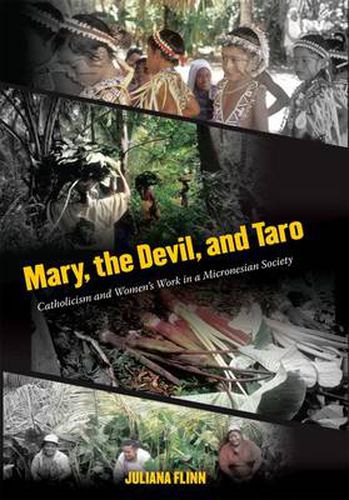Readings Newsletter
Become a Readings Member to make your shopping experience even easier.
Sign in or sign up for free!
You’re not far away from qualifying for FREE standard shipping within Australia
You’ve qualified for FREE standard shipping within Australia
The cart is loading…






Catholicism, like most world religions, is patriarchal, and its official hierarchies and sacred works too often neglect the lived experiences of women. Looking beyond these texts, Juliana Flinn reveals how women practice, interpret, and shape their own Catholicism on Pollap Atoll, part of Chuuk State in the Federated States of Micronesia. She focuses in particular on how the Pollapese shaping of Mary places value on indigenous notions of mothering that connote strength, active participation in food production, and the ability to provide for one’s family. Flinn begins with an overview of the Feast of the Immaculate Conception on Pollap and an introduction to Mary, who is celebrated by islanders not as a biologized mother but as a productive one, resulting in an image of strength rather than meekness: for Pollapese women Mary is a vanquisher of Satan, a provider for her children, and a producer of critical resources, namely taro. The Feast of the Immaculate Conception validates and celebrates local notions of motherhood in ways that highlight productive activities. The role of women as producers in the community is extolled, but the event also provides and sanctions new opportunities for women, allowing them to speak publicly, exhibit creativity, and influence the behavior of others. A chapter devoted to the imagery of Mary and its connections to Pollapese notions of motherhood is followed by a conclusion that examines the implications of these for women’s ongoing productive roles, especially in comparison with Western notions and contexts in which women have been removed or excluded from production.
Mary, the Devil, and Taro
contributes significantly to the study of women’s religion and the appropriation of Christianity in local contexts. It will be welcomed by not only anthropologists and other scholars concerned with religion in the Pacific, but also those who study change in gender roles and Marian devotions in cross-cultural perspectives.
$9.00 standard shipping within Australia
FREE standard shipping within Australia for orders over $100.00
Express & International shipping calculated at checkout
Catholicism, like most world religions, is patriarchal, and its official hierarchies and sacred works too often neglect the lived experiences of women. Looking beyond these texts, Juliana Flinn reveals how women practice, interpret, and shape their own Catholicism on Pollap Atoll, part of Chuuk State in the Federated States of Micronesia. She focuses in particular on how the Pollapese shaping of Mary places value on indigenous notions of mothering that connote strength, active participation in food production, and the ability to provide for one’s family. Flinn begins with an overview of the Feast of the Immaculate Conception on Pollap and an introduction to Mary, who is celebrated by islanders not as a biologized mother but as a productive one, resulting in an image of strength rather than meekness: for Pollapese women Mary is a vanquisher of Satan, a provider for her children, and a producer of critical resources, namely taro. The Feast of the Immaculate Conception validates and celebrates local notions of motherhood in ways that highlight productive activities. The role of women as producers in the community is extolled, but the event also provides and sanctions new opportunities for women, allowing them to speak publicly, exhibit creativity, and influence the behavior of others. A chapter devoted to the imagery of Mary and its connections to Pollapese notions of motherhood is followed by a conclusion that examines the implications of these for women’s ongoing productive roles, especially in comparison with Western notions and contexts in which women have been removed or excluded from production.
Mary, the Devil, and Taro
contributes significantly to the study of women’s religion and the appropriation of Christianity in local contexts. It will be welcomed by not only anthropologists and other scholars concerned with religion in the Pacific, but also those who study change in gender roles and Marian devotions in cross-cultural perspectives.